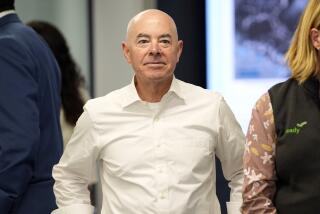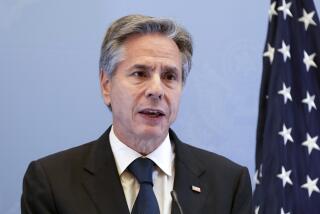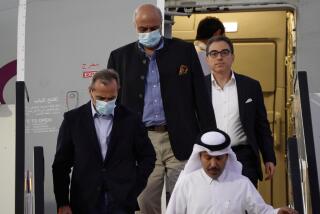Last Freedom Flight Arrives in N. Carolina With 111 Aboard : Refugees: At least 41 of the passengers are American. The rest hail from 12 other nations. It is the final evacuation run chartered by the U.S.
- Share via
RALEIGH, N.C. — The last scheduled U.S.-chartered freedom flight from Kuwait and Iraq landed here Sunday night, ending a long hostage ordeal for 111 people, most of them women and children. At least 41 of the passengers were Americans.
Some waved the Stars and Stripes as they left the aircraft at Raleigh-Durham International Airport, and Joe Myers, director of the North Carolina Emergency Management Division, remarked: “These people seemed very relieved to be here. You could see it on their faces.”
Myers also underscored the end-of-the-run nature of Sunday’s flight, saying: “This is the last (flight) we’ve been told to prepare for.”
The homecoming signaled the start of what some Bush Administration officials believe may be a more trying phase of the Persian Gulf crisis. Many American men, as well as women unwilling to leave their husbands or families, had to be left behind--pawns in the international crisis touched off by Iraqi President Saddam Hussein’s invasion of Kuwait nearly eight weeks ago.
The World Airways DC-10 flying from Gatwick International Airport in London arrived here about 6 p.m., carrying 76 adults and 35 children.
One 58-year-old woman on the charter was a diabetic who was accompanied by a physician on the flight; she was immediately taken to a nearby hospital as a precautionary measure. Twenty of the evacuees were scheduled to take outgoing flights bound for destinations in California.
Besides the 41 Americans on board, the travelers hailed from 12 countries, including 43 from Jordan. Many of the passengers are dependents or relatives of Americans, or persons who hold passports for two or more countries, according to U.S. officials.
When the plane left the Iraqi capital of Baghdad on Saturday morning, there were 140 passengers aboard; the rest stayed in Britain when it stopped over there Saturday night.
Many of the American women on the flight are married to Kuwaitis and other Arabs who stayed behind.
Khalid Abdu, 28, a male U.S. citizen, was allowed by Hussein’s government to leave the tense Persian Gulf region because he is Arab-born.
Abdu said he immigrated to the United States in 1981 to attend the University of Wisconsin at Milwaukee; he left his parents and family in Kuwait.
He said that although Iraqi officials let him leave because of his place of birth, they turned away his three siblings when they tried to board the plane in Baghdad because none of them has U.S. citizenship.
“Most Americans got caught,” Abdu said. “They (the Iraqis) are searching houses (in Kuwait). Most of the (American) women and children got out. I don’t know about the men.”
Abdu waved an American flag and his U.S. passport as he spoke with reporters. He said “there is not much killing” in Kuwait now but that looting continues to worsen. He said Kuwaitis feel that a drive by Hussein to recruit more soldiers in Iraq and also in neighboring countries such as Jordan is “a show of strength and a sign of war.”
“I think it will get worse,” he said. “That’s why I left.”
Sunday’s flight--the seventh since the charters began Sept. 9--brought the number of American evacuees and their foreign-born family members to about 2,000, U.S. officials reported.
The Associated Press reported that when the plane arrived at Gatwick Airport on Saturday night, one American man who would not give his name said of Kuwait: “It is really trashy out there at the moment.”
Joanna Copley, who is helping run the Gulf Support Group for Britons trapped by the Iraqi invasion, said in London: “This flight was different from the others. People were less distressed but more desperate.
“I think a lot of them didn’t want to come out but came because there was nothing else to do. It seems food and water is becoming a problem for people still in Kuwait; the soldiers are doing a lot of systematic rounding up now and there is a fair amount of shooting going on,” she said.
Jacqui Jones, a Briton who was forced to leave her terminally ill husband in Iraq, called on the government to act to get sick Britons out of Iraq, the Associated Press reported.
“The American Consulate have taken their terminally ill out, so have the Italians, why can’t we do something?” she asked.
More to Read
Sign up for Essential California
The most important California stories and recommendations in your inbox every morning.
You may occasionally receive promotional content from the Los Angeles Times.










